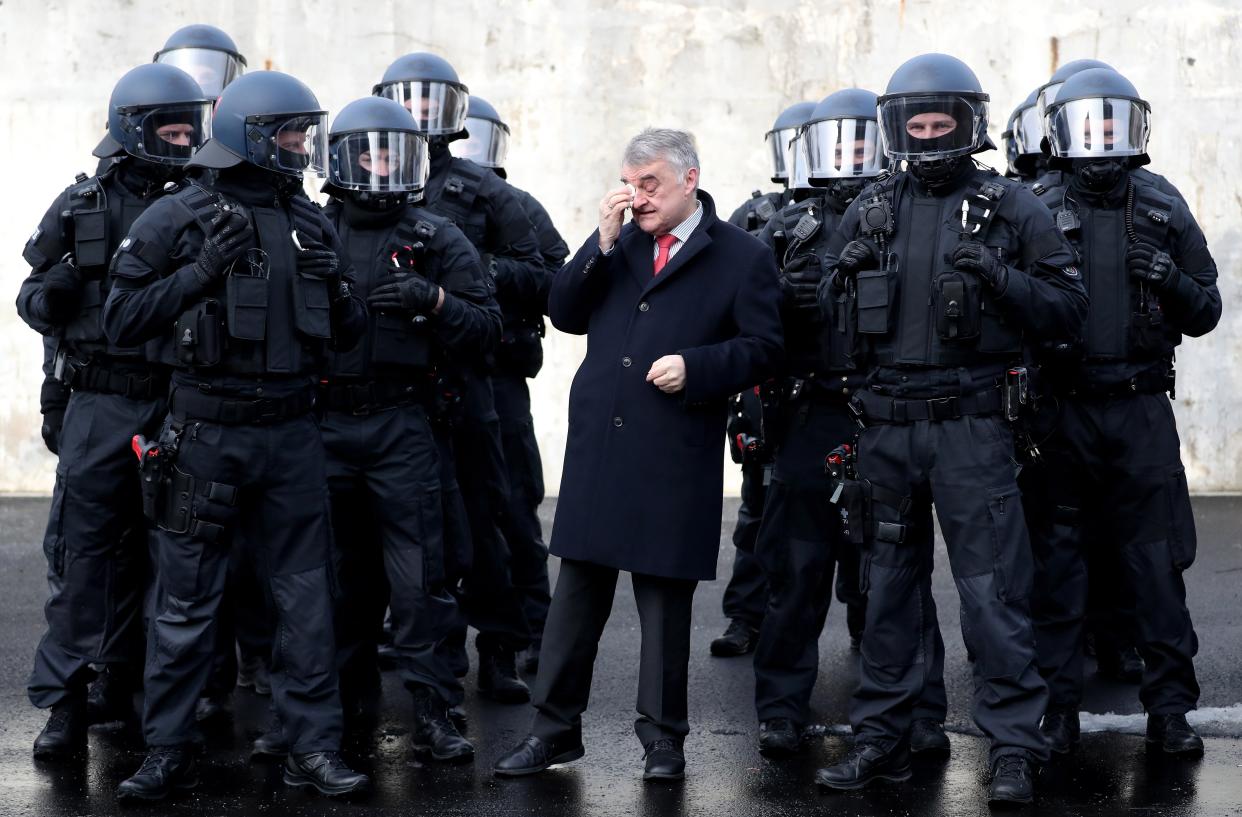‘Despicable neo-Nazi immigrant baiting': German police officers suspended for sharing pictures of Hitler and refugees in gas chambers

Nearly 30 police officers in Germany have been suspended after members of a force shared pictures of Adolf Hitler, black people being shot and depictions of refugees in gas chambers, prompting alarm at the extent of far-right infiltration within law enforcement networks.
Some among the 29 North Rhine-Westphalia (NRW) officers are also accused of using far-right chatrooms where extremist content was shared that breaches Germany’s constitution, such as Swastikas and other Nazi symbolism, Reuters reported.
Eleven of the suspects could be charged with disseminating Nazi propaganda and hate speech and 14 will likely be dismissed from the police. Eighteen are accused of failing to report their colleagues.
“This is a disgrace for the NRW police,” said NRW interior minister Herbert Reul.
Mr Reul described the 126 images shared to at least five online WhatsApp groups used entirely or largely by police officers as the “ugliest, most despicable, neo-Nazi, racist refugee baiting”.
One of those groups apparently was set up in 2012, and the one that contained the most images, in 2015. The most recent message was sent on 27 August.
While politicians and officials have so far been reticent to acknowledge far-right infiltration within law enforcement as organised networks, insisting those uncovered previously were individual cases, Mr Reul was reported as saying: “Today, I can no longer speak of individual cases.”
The minister pledged to set up a special inquiry in Essen, where most of the suspects worked, and voiced plans to appoint a special envoy for “far-right extremist tendencies” to devise ways of detecting extremism early within the state’s police force.
“We have to ask unpleasant questions of ourselves,” he added. “Who knew about this? Why was this tolerated for years? By whom?”
“I'm appalled and ashamed,” said Frank Richter, chief of Essen’s police force. “It is hard to find words.”
The WhatsApp groups were discovered when a 32-year-old NRW police officer’s personal mobile phone was confiscated during a separate probe into whether he had passed confidential information about an organised crime group to a journalist, local media reported.
Some 200 investigators raided the homes and workplaces of 14 of the 29 suspended officers in at least five towns and cities on Wednesday morning, seizing phones and “extensive” evidence on memory devices.
Mr Reul said he expected more cases were likely as the seized evidence was investigated.
Most of the officers allegedly involved worked at some point at the same police precinct in Muelheim an der Ruhr, Mr Reul said. All 29 were suspended with immediate effect on Wednesday, and disciplinary proceedings opened.
It comes amid growing concern that far-right nationalists may be gaining a foothold in Germany’s uniformed services.
Some 600 soldiers were said to be under investigation over allegations of extremist ties in July, when the German government disbanded an entire elite military unit after reports that officers used Hitler salutes and privately stocked weapons.
Twenty of the KSK units 1,400 soldiers were placed under investigation over suspected far-right ties. One sergeant major suspected of having extremist links was found to have a cache of weapons in a bunker at his home.
And last month, German prosecutors said they were investigating a retired police officer suspected of sending threatening emails, signed with the name of a gang of neo-Nazi killers, to prominent figures with foreign heritage.
The emails, including some sent to politicians with a Turkish background, were signed “NSU 2.0”, a reference to the “National Socialist Underground” neo-Nazi gang, which killed 10 people, mainly immigrants, between 2000 and 2007.
Following the case, the interior minister in Hesse publicly raised concerns about a far-right “network” in his police force, The New York Times reported.
And in Baden-Wuerttemberg, seven police cadets were also investigated for exchanging right-wing extremist content in a private WhatsApp group, the dpa news agency reported. A similar group brimming with anti-Muslim sentiment was also found in Bavaria last year.
In July, Germany's top federal security official, Horst Seehofer, rejected calls for a probe into the extent of racial profiling by the police, insisting that there was "no structural problem".
On Wednesday, Mr Seehofer's spokesperson cautioned against making “sweeping allegations” against the whole German police, which has 300,000 officers.
“But of course it's clear, as the current case shows, that we're not talking about individuals,” he said.
“The battle against right-wing extremism is in the DNA of the police,” said regional deputy chair of the GdP union, Michael Maatz.
“The fact that there are, nevertheless, officers who share radical, far-right and xenophobic content in chat groups is unbearable,” he added.
Additional reporting by agencies
Read more
German leaders condemn far-right attempt to storm Reichstag
Far-right groups targeting hotels housing asylum seekers during coronavirus pandemic
Far-right extremist who had Christchurch terror attack manifesto was collecting bomb components

